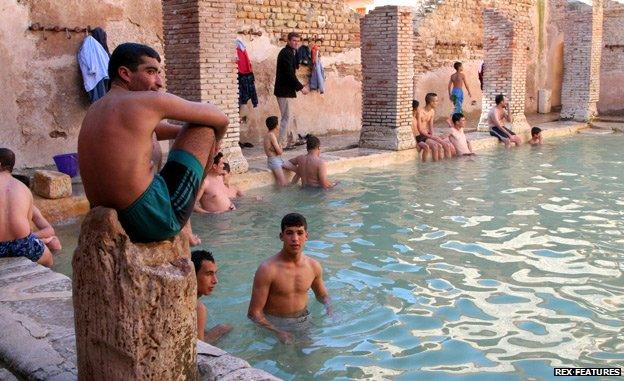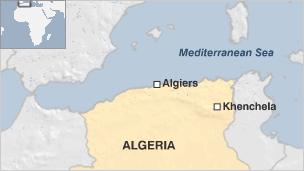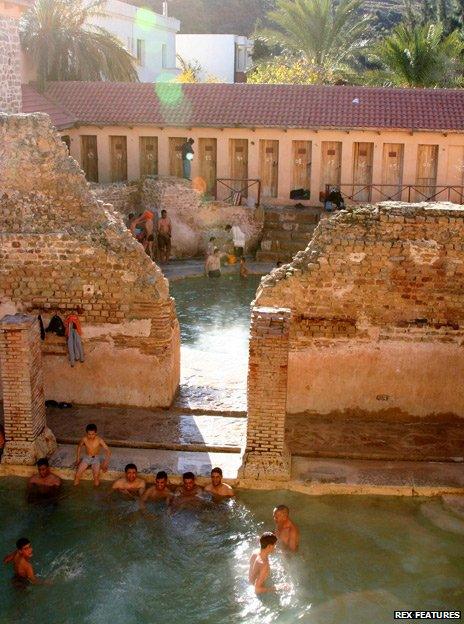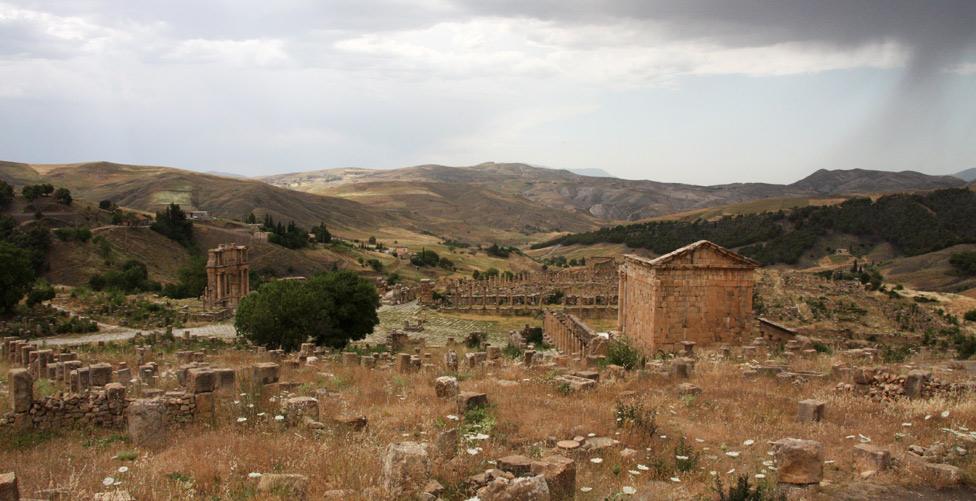A Roman bathhouse still in use after 2,000 years
- Published

Roman ruins are rarely boisterous places, full of noise, laughter and life. But Edward Lewis stumbled across one that is - a place to have a daily wash, and to enjoy the companionship of friends, just as it was for the Romans who built it.
Observing middle-aged men swathed in white foamy soapsuds is not something I would normally write home about and it certainly wasn't why I was in north-east Algeria.
I had come to look at the Roman baths in Khenchela and had overlooked the fact that for many of the local population the attraction was not the ancient architecture or remarkable state of preservation but the fact there was a free and plentiful supply of hot water - still feeding into two open air baths.
Fully clothed and with no towel in sight, the stares and hush that followed me as I walked around the water's edge began to make me wonder if my visit was entirely appropriate.

As with many such situations, I needn't have worried. Algeria is no exception to the humbling levels of warmth and generosity that strangers are afforded in this part of the world and within minutes of trying to talk in my best French - or, even less comprehensible there - my best Egyptian Arabic, I was surrounded by a group of men in swimming shorts eager to answer my queries about the baths and their history.
We were standing next to the smaller bath, its circular rim beautifully shaped by large white blocks of stone worn smooth over centuries of use. Complete with a ledge on which to sit, it resembled a sort of ancient hot tub.
"The Romans built them, before Jesus," shouted one man, shampoo bottle in hand. Another piped up: "But they were damaged in an earthquake and that's when the Ottomans came and repaired it."
Indeed there had been an earthquake in the 14th Century. Even if their dates were a little out, you couldn't fault their enthusiasm and glowing pride.

The daily ritual of public bathing is still clearly alive and well in Khenchela.
In fact, as I stepped over the stretched legs and passed reclined bodies dangling their legs in the sea-green water, I got the impression nothing had really changed since the baths were constructed in the first century AD. Only the more recent Ottoman brickwork, the newly constructed changing room doors and the numerous brightly coloured plastic buckets gave the game away.
The important social function of a bathhouse has also been retained - family issues are discussed and resolved and jokes and stories are told to echoing laughter and the sound of a slapped thigh, back or hand.
Sport is heatedly debated, politics perhaps less so in this country - suspicion of who is hearing what remains a hangover from the civil war when careless talk cost lives. Few have the stomach or wish to risk more conflict - one of many plausible explanations as to why the Arab Spring went largely unnoticed in Algeria.
Aside from this striking continuity, what makes Khenchela stand out from many other historical sites in Algeria is the fact that despite being amongst the smallest, and certainly lesser known, it is one of the few places where you can easily interact with the local people.
In the days preceding my visit I had wandered some of the country's most prominent Roman ruins:
Tipasa, a beautiful seaside town on the shores of the Mediterranean once famous for its fish paste
Timgad, a perfect example of Roman town planning that was once home to 15,000 people.
And then my personal favourite:
Djemela (meaning "beautiful" in Arabic) - nestled in a lush valley with a market square that looks like it ceased to be used only last century.

Yet in all of these places I didn't get the chance to speak to anyone - indeed in the Roman Army garrison of Lambesis my only other companion was a Jaribu stork that had made its impressive nest on top of the triumphal arch.
In Khenchela I said my goodbyes and had a few last knowing laughs with my semi-naked hosts, the younger ones by now reeling off every English footballer they could think of in a bid to impress.
"Have you been to Khemissa?" One of the older men asked.
"No," I replied, genuinely not knowing where he meant or what was there.
"Oh, but you must. The best preserved Roman amphitheatre in the country - djemela, beautiful!"
I checked my guidebook. There was no mention of Khemissa,. My towelled friend placed his damp finger on the map where three dots indicated a site of historic interest, one of dozens scattered all over the country. I got in the car and prepared myself for another solitary visit - already grateful for my bath encounter.
From Our Own Correspondent, external: Listen online or download the podcast.
BBC Radio 4: Saturdays at 11:30 and some Thursdays at 11:00
BBC World Service: Short editions Monday-Friday - see World Service programme schedule.
Follow @BBCNewsMagazine, external on Twitter and on Facebook, external